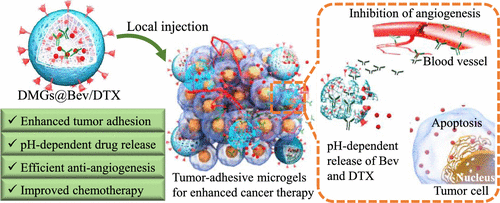当前位置:
X-MOL 学术
›
Biomacromolecules
›
论文详情
Our official English website, www.x-mol.net, welcomes your
feedback! (Note: you will need to create a separate account there.)
Tumor-Adhesive and pH-Degradable Microgels by Microfluidics and Photo-Cross-Linking for Efficient Antiangiogenesis and Enhanced Cancer Chemotherapy.
Biomacromolecules ( IF 5.5 ) Pub Date : 2020-02-24 , DOI: 10.1021/acs.biomac.0c00049 Xingmei Chen 1 , Hongliang Qian 1 , Haishi Qiao 1 , Bin Dong 1 , Enping Chen 1 , Dechun Huang 1 , Ting Wang 1 , Wei Chen 1
Biomacromolecules ( IF 5.5 ) Pub Date : 2020-02-24 , DOI: 10.1021/acs.biomac.0c00049 Xingmei Chen 1 , Hongliang Qian 1 , Haishi Qiao 1 , Bin Dong 1 , Enping Chen 1 , Dechun Huang 1 , Ting Wang 1 , Wei Chen 1
Affiliation

|
Tumor angiogenesis with the vascular network formation provides nutrition and oxygen for cancer cells, promoting the proliferation and metastasis of malignant tumors. Bevacizumab (Bev) as an efficient antiangiogenic antibody is able to normalize the tumor vasculature with better blood flow and reduced interstitial fluid pressure, allowing drugs with more uniform distribution and deeper penetration into the tumor; however, it is highly difficult to realize the simultaneous delivery of Bev and anticancer drugs localized at the tumor tissue. Here, we prepared tumor-adhesive and pH-degradable poly(vinyl alcohol) (PVA) microgels for tumor-localized delivery of Bev and docetaxel (DTX), to achieve efficient antiangiogenesis and enhanced cancer chemotherapy. PVA microgels (∼200 μm) decorated with tissue-adhesive dopamine (DA) moieties were fabricated by a combination of high-throughput microfluidics technology and photo-cross-linking chemistry with a considerable coencapsulation efficiency for Bev and DTX. PVA microgels exhibited sustained drug release at the tumoral acidic conditions as the microgel degradation, and DA moieties on the microgels facilitated Bev with long retention at the tumor tissue, highly blocking the vascular endothelial growth factor (VEGF) and inhibiting tumor angiogenesis, as compared to free Bev or no DA-decorated microgels. In addition, the antitumor activity on the 4T1-Luc breast tumor mouse model treated with Bev/DTX-coloaded microgels showed obviously superior tumor growth inhibition than the other treatment groups, in which the combinational therapy efficacy of Bev and DTX mediated by the tumor-adhesive microgels was further confirmed by the immunohistochemistry (IHC) analysis. These PVA microgels with efficient antiangiogenesis and enhanced cancer chemotherapy provide a highly potential platform to treat different malignant tumors as well as the recurrent and metastatic tumors.
中文翻译:

通过微流控和光交联的肿瘤粘附和pH可降解微凝胶,可有效进行抗血管生成和增强的癌症化学治疗。
具有血管网络形成的肿瘤血管生成为癌细胞提供营养和氧气,从而促进恶性肿瘤的增殖和转移。贝伐单抗(Bev)作为一种有效的抗血管生成抗体,能够以更好的血流量和降低的间质液压力使肿瘤血管正常化,从而使药物具有更均匀的分布和更深的渗透性;然而,很难同时实现位于肿瘤组织的Bev和抗癌药物的同时递送。在这里,我们准备了肿瘤粘附性和pH可降解的聚乙烯醇(PVA)微凝胶,用于Bev和多西他赛(DTX)的肿瘤局部递送,以实现有效的抗血管生成和增强的癌症化学疗法。通过高通量微流控技术和光交联化学相结合,制备出具有组织粘附性多巴胺(DA)部分的PVA微凝胶(〜200μm),对Bev和DTX具有显着的共包封效率。与微凝胶降解相比,PVA微凝胶在肿瘤酸性条件下表现出持续的药物释放,与之相比,微凝胶上的DA部分促进了Bev在肿瘤组织中的长期保留,高度阻断了血管内皮生长因子(VEGF)并抑制了肿瘤血管生成免费的Bev或无DA装饰的微凝胶。此外,用载有Bev / DTX的微凝胶处理的4T1-Luc乳腺肿瘤小鼠模型的抗肿瘤活性明显优于其他治疗组,免疫组织化学(IHC)分析进一步证实了Bev和DTX由肿瘤粘附微凝胶介导的联合治疗功效。这些具有有效抗血管生成和增强的癌症化学疗法的PVA微凝胶为治疗不同的恶性肿瘤以及复发性和转移性肿瘤提供了极具潜力的平台。
更新日期:2020-02-24
中文翻译:

通过微流控和光交联的肿瘤粘附和pH可降解微凝胶,可有效进行抗血管生成和增强的癌症化学治疗。
具有血管网络形成的肿瘤血管生成为癌细胞提供营养和氧气,从而促进恶性肿瘤的增殖和转移。贝伐单抗(Bev)作为一种有效的抗血管生成抗体,能够以更好的血流量和降低的间质液压力使肿瘤血管正常化,从而使药物具有更均匀的分布和更深的渗透性;然而,很难同时实现位于肿瘤组织的Bev和抗癌药物的同时递送。在这里,我们准备了肿瘤粘附性和pH可降解的聚乙烯醇(PVA)微凝胶,用于Bev和多西他赛(DTX)的肿瘤局部递送,以实现有效的抗血管生成和增强的癌症化学疗法。通过高通量微流控技术和光交联化学相结合,制备出具有组织粘附性多巴胺(DA)部分的PVA微凝胶(〜200μm),对Bev和DTX具有显着的共包封效率。与微凝胶降解相比,PVA微凝胶在肿瘤酸性条件下表现出持续的药物释放,与之相比,微凝胶上的DA部分促进了Bev在肿瘤组织中的长期保留,高度阻断了血管内皮生长因子(VEGF)并抑制了肿瘤血管生成免费的Bev或无DA装饰的微凝胶。此外,用载有Bev / DTX的微凝胶处理的4T1-Luc乳腺肿瘤小鼠模型的抗肿瘤活性明显优于其他治疗组,免疫组织化学(IHC)分析进一步证实了Bev和DTX由肿瘤粘附微凝胶介导的联合治疗功效。这些具有有效抗血管生成和增强的癌症化学疗法的PVA微凝胶为治疗不同的恶性肿瘤以及复发性和转移性肿瘤提供了极具潜力的平台。











































 京公网安备 11010802027423号
京公网安备 11010802027423号